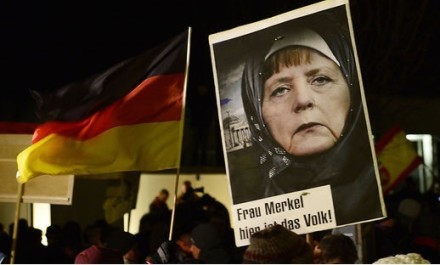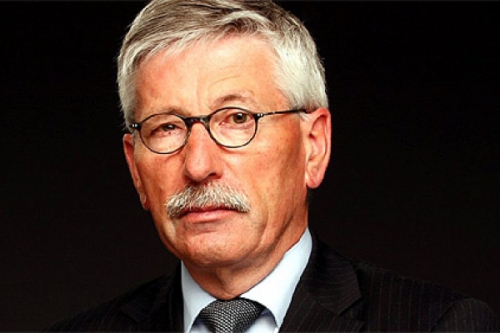Thilo Sarrazin is the author of Deutschland schafft sich ab (“Germany Abolishes Itself”), an anti-immigration book that cost him his position on the board of Deutsche Bundesbank and made him a pariah among his former comrades in the Social Democrats. The following op-ed by Mr. Sarrazin, which was published on Sunday at the blog Die Achse des Guten, has been translated by Rembrandt Clancy.
Frau Merkel Assumes a Reserved Stance
by Thilo Sarrazin
17 April 2016
The past weeks have brought two deciding events, which could become the turning points for German (and European) contemporary history:
The Alternative für Deutschland (AfD) entered three additional state parliaments with double-digit returns. In Saxony-Anhalt and Baden-Württemberg they became the second largest party; in Rhineland-Palatinate they won more votes than the Greens and the Free Democratic Party (FDP) combined, and then with an unusually high voter participation. With respect to the overriding refugee question, many citizens apparently perceived the Christian Democratic Union (CDU), Social Democratic Party (SPD), Greens and the Left parties to be an opinion cartel and voted for the only party which called for an alternate refugee and immigration policy.
The coming months will show whether the as yet entirely inexperienced AfD (Alternative für Deutschland) mature into a major conservative party and overcome their relegation to the right-wing fringe. But this period will also show whether the other parties have understood the message of these elections. Many initial reactions give cause for doubt. The predominant analysis of established parties was that 75 to 85 percent of the voters did not choose the AfD, and this circumstance allows them to point to an overwhelming approval of the federal government’s refugee policy. Angela Merkel in particular acts as if the election results are of no importance to her federal government policy. As always it was Horst Seehofer of the Union, who as the only leading politician, dissented. But this dissent has a more muted effect each time it occurs, since it obviously does not lead to action. [Union: Christian Democratic Union (CDU) and the Christian Social Union (CSU) collectively]
Finding relief from the strongest enemies of the refugee policy
The federal government is finding relief in the strongest enemies of their refugee policy: the closure of the Balkan route launched in concert by Austria and the Balkan states led to dramatically declining arrival figures. Shortly before Easter, there were in fact several evenings in which refugees were not featured in the lead story of the television news. Good people in responsible positions were able to sidestep responsibility: The decline in the refugee numbers provided urgently needed relief, whilst their own welcoming culture need not be called into question.
The second deciding event was the EU refugee summit with Turkey. It left numerous questions open to be sure, but the nucleus of the agreement with Turkey nevertheless put a great deal in motion: if in future Greece actually sends back to Turkey all newly arriving refugees, soon there will no longer be anyone left to embark on this refugee route. Success of one part of the agreement means that the other part will run dry: if only a few refugees leave Turkey for Greece, only a few will also return; and the number of other refugees whom Turkey can then pass on to Europe as compensation will be correspondingly small.
On the other hand, in other respects this is good; for at the refugee summit, there was clearly no attempt made to agree a method for the distribution of refugees and illegal immigrants throughout the Schengen area. But such a settlement is prerequisite to the ability of the Schengen system to function at all over the long term.

The question of terrorism cannot be meaningfully separated from the refugee question
A large number of Schengen countries have reservations about the further reception of refugees and illegal immigrants. That applies not only to the Eastern European states, but also to countries like France and Belgium. The integration of Muslims in those countries has succeeded only partially. The terrorist attacks which so rocked the two countries came from these groups. Moreover, it became clear from the connections which have been disclosed over the past weeks, that it is no longer possible to meaningfully separate the question of terrorism from the refugee question. The secret services are also aware of that, but the confusion in people’s minds has become much greater. Inevitably those political factions fundamentally in critical opposition to immigration from the Islamic cultural sphere will be strengthened.
If we assume that Angela Merkel would like to maintain the nucleus of her refugee policy, that obviously means that large numbers of people would continue to arrive, only they would simply be organised and distributed among the Schengen countries on the basis of an agreed procedure. Whom does she still have as allies? The Scandinavian states and Austria are no longer allies, while the Eastern European countries have never been allies. That leaves the Netherlands, Switzerland and Italy. In any case, the latter allows all refugees to continue their journey north, and in fact only a few even want to remain in Italy because the social services are so poor.
Conclusion: either Germany will continue to accept the bulk of the refugees and illegal immigrants to Europe, or she will change her welcoming culture. For this point to be reached, the agreement with Turkey could constitute a stepping stone. But does it really? Presumably Angela Merkel herself is not aware of this; obviously she is assuming a reserved stance. Never will she admit having acted improperly when last year she opened the borders.
The People Smugglers are already Redirecting Themselves
The agreement with Turkey has won time until the summer. All those Germans still disinclined to take leave of their illusions can project their wishes onto its success. By summer it will be apparent that even in the event of the agreement’s success, ample refugee routes across the Mediterranean will remain open. Already the people smugglers are redirecting themselves.
By the summer we will even know whether the price Europe is paying for the agreement is acceptable: Turkey would like the visa exemption for her citizens. In order to acquire it, the refugee waves serve as a lever to exert pressure. Visa exemption could, however, signify the next large wave of refugees: 30 percent of Turkish citizens are of Kurdish origin. Erdogan’s government is waging war against this minority. For the Kurds who have been persecuted and victimised by this war it could be very easy in the future should they wish to apply for asylum in Europe: They would only have to board an aeroplane with valid personal identification, and their reasons for asylum would be at least as good as those of numerous Eritreans, Afghans and Syrians. Did Angela Merkel consider the implications of visa exemption for Turkey or did she approve them? No matter how one looks at it, there is no concept to be discerned either intellectually or practically in the German refugee policy.





 del.icio.us
del.icio.us
 Digg
Digg
Les commentaires sont fermés.